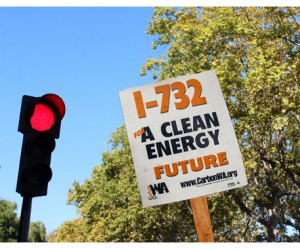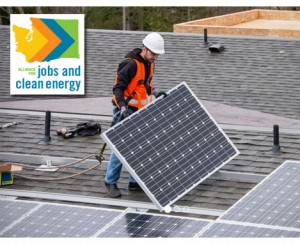ELECTION
WSLC opposes Initiative 732 carbon tax
(Jan. 28, 2016) — The Executive Board of the Washington State Labor Council, AFL-CIO — representing more than 600 union organizations with some 450,000 members across the state — voted this week to oppose Initiative 732, a statewide ballot measure that would create a new tax on carbon emissions while cutting other state taxes. Although I-732 proponents intended the measure to be “revenue neutral,” the state Department of Revenue now estimates it will cost the state $914 million over the next four years.
 After the board’s vote, WSLC President Jeff Johnson issued the following statement:
After the board’s vote, WSLC President Jeff Johnson issued the following statement:
“To deal with the climate crisis and rising global temperatures effectively, an economic transformation will be required — a transformation that cannot exclude the voices of working people, their unions, or communities of color. We need a carbon and greenhouse gas reduction policy that caps and prices carbon, and then invests carbon revenues in leveraging the new clean energy economy in a manner that is equitable for working people and communities of color. No worker or community should be left behind in this economic transformation.
“I-732 does not address these concerns and, in fact, locks us in to a single policy that will cost our state General Fund nearly $1 billion. At a time our state is struggling to fund basic services — including public schools, mental health facilities, and many other essential services — I-732 would send Washington in the wrong direction and create more damaging austerity choices.”
 When petitioners for Carbon Washington were collecting signatures for I-732 last year, they told people the measure was revenue neutral because the carbon tax would be offset by reductions in business, sales and other taxes. The approach was designed to appeal to conservatives.
When petitioners for Carbon Washington were collecting signatures for I-732 last year, they told people the measure was revenue neutral because the carbon tax would be offset by reductions in business, sales and other taxes. The approach was designed to appeal to conservatives.
“I am increasingly convinced that the path to climate action is through the Republican Party,” I-732 sponsor and Carbon Washington founder Yoram Bauman told The New York Times last fall. “There are challenges on the right — skepticism about climate science and about tax reform — but those are surmountable with time and effort. The same cannot be said of the challenges on the left: an unyielding desire to tie everything to bigger government, and a willingness to use race and class as political weapons in order to pursue that desire.”
But as it turns out, I-732 is not revenue neutral and instead will cost the state nearly $1 billion over the next four years at a time legislators are being held in contempt of the State Supreme Court for failing to sufficiently fund the state’s public schools.
Plus, it will make Washington’s regressive tax system, where people with the lowest incomes pay the highest percentage of their income in taxes of any other state in the nation, even more regressive. Even I-732 supporters acknowledge this is true.
 “Carbon taxes are regressive in terms of disproportionately impacting low income people,” admits Carbon Washington co-chair Joe Ryan. “Our state tax system is already regressive so to make it more regressive is a concern for Carbon Washington.”
“Carbon taxes are regressive in terms of disproportionately impacting low income people,” admits Carbon Washington co-chair Joe Ryan. “Our state tax system is already regressive so to make it more regressive is a concern for Carbon Washington.”
Even before the true cost of I-732 was revealed, the Washington Machinists Council passed a resolution opposing I-732 that echoed many of the concerns shared by WSLC officers. It pointed out that Initiative 732:
- Ignores the fact that simply making it more expensive to pollute will not magically build the infrastructure necessary to convert to a clean-energy economy that allows people to live more sustainably.
- Ignores the revenue crisis the State of Washington with chronic underfunding of public schools, universities, transportation and other critical services that citizens want and need to maintain our quality of life.
- Ignores the disproportionate negative consequences of climate change on communities of color and low-income communities.
Noting Bauman’s cynical comments, the Machinists’ resolution read, “the urgency of climate change… demands unity and collaboration, not the partisan bickering associated with I-732.”
 The WSLC is part of the Alliance for Jobs and Clean Energy, a broad coalition bringing together organized labor, environmental and business interests, community groups and other constituencies to support climate solutions that recognize:
The WSLC is part of the Alliance for Jobs and Clean Energy, a broad coalition bringing together organized labor, environmental and business interests, community groups and other constituencies to support climate solutions that recognize:
1) The cost of carbon emissions to our economy and communities, particular communities of color and those with low incomes that are currently disproportionately harmed by pollution.
2) The need for a “Just Transition” to a clean economy that protects working families whose livelihoods depend on the fossil-fuel and carbon-producing industries.
3) The importance of creating good family-wage jobs in the new clean-energy economy.
The Alliance is continuing to work on a comprehensive carbon policy that addresses I 732’s shortcomings. For more information, visit their website.





